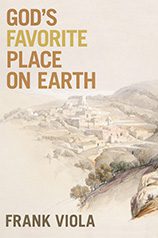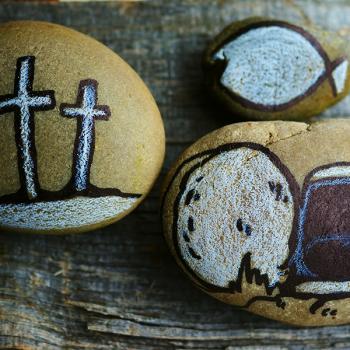 My friend Frank Viola has just released a new book called God’s Favorite Place on Earth that highlights the massive benefits that come to us from accepting Jesus, rejecting bitterness, and being freed from a guilty conscience, fear and doubt. You can read a sample of the book for free.
My friend Frank Viola has just released a new book called God’s Favorite Place on Earth that highlights the massive benefits that come to us from accepting Jesus, rejecting bitterness, and being freed from a guilty conscience, fear and doubt. You can read a sample of the book for free.
This is a book should help you gain a new perspective as you look at EVERYTHING. It’s a quick, inspiring, and entertaining read.
In addition, if you get the book between May 1st to May 7th, you will also get 25 FREE GIFTS from 15 different authors, including a free digital copy of my own book.
Here is my own endorsement for “God’s Favorite Place on Earth.”
“Familiar stories scattered in different parts of the gospels are woven together into one narrative in this innovative work. Fictional elements help bring the events to life, and each chapter concludes with practical teaching to drive home the message that if you choose to welcome Jesus into your life, remarkable consequences will follow. Frank’s refreshing and infectious passion for Jesus permeates every word.”
Well known American pastor and author, Jack Hayford wrote:
“Frank probes the ‘deep calls unto deep’ content of the Holy Spirit’s call within the Scriptures, and awakens that hunger that must be regularly fed to secure renewal in each of us. God’s Favorite Place on Earth is the kind of book I’ve discovered I need to periodically find and read; thereby keeping ‘the fallow ground’ of my own soul plowed, re-sown and watered, in order to continue fruitfulness and to deepen the root system of my spiritual walk and growth in Christ.”
While Joe Carter of the Gospel Coalition also endorsed the book as follows:
“In the scope of the Biblical story, weren’t Lazarus, Martha, and Mary just minor figures living in a unimportant village? That’s certainly what I assumed until Frank Viola showed me what I had been missing. With a mix of creative narrative and pastoral insight, Viola reveals what these friends of Jesus meant to Him—and what that means for us.”
The premise of Viola’s book is simple: when Jesus was on the earth, he was rejected almost everywhere he went . . . from Bethlehem, to Nazareth, to Jerusalem. The main exception was the little village of Bethany.
The curtain opens with a brilliant literary device which has a great history in Christian writing: creating a fictional rendition of the Bible accounts, while keeping close to the actual text. Viola puts words into the mouth of Lazarus, who is now ready to die, and recounts the incomparable story of Jesus’ interactions with him, Martha, and Mary. God’s Favorite Place on Earth blends drama, devotion, biblical narrative, and first-century history to create a riveting book that you’ll find difficult to put down. Within each narrative, the common struggles Christians face are addressed and answered.
Go to Frank’s Patheos Blog to claim your 25 FREE GIFTS, read a Sampler of the book, or watch the video trailer at the end of this post.
Frank has kindly agreed to be interviewed here on my blog:
Frank, your latest book takes a very unusual style, mixing fictional narrative and practical teaching. What inspired you to try out this style? Was it hard to write in this way?
Story is the language of our world. Of course, it was also Jesus’ favorite way of teaching. But today, we have a culture that gravitates toward story, image, and metaphor. The philosopher Ivan Illich aptly said,
“Neither revolution nor reformation can ultimately change a society, rather you must tell a new powerful tale, one so persuasive that it sweeps away the old myths and becomes the preferred story, one so inclusive that it gathers all the bits of our past and our present into a coherent whole, one that even shines some light into the future so that we can take the next step.… If you want to change a society, then you have to tell an alternative story.”
What I do in the book is tell a “hidden obvious” story that’s spread through the Gospels. I put the story in chronological order, then I tell it through the eyes of Lazarus. It’s not really “fiction” because it stays very close to the biblical text and is faithful to first-century history. For this reason, two New Testament scholars have endorsed it.
It also has a practical teaching section which is non-fiction.
Was it hard to write? Yes and no. Certain parts where Lazarus speaks were difficult because I’m used to writing straight prose. But I had two fiction authors help me with those parts.
Readers can read a free sample of the book to get an idea of the story part and the practical teaching part. There’s also a video trailer that goes with it. And, as I say at the end of this post, if they buy the book before May 7th, they will receive 25 free resources by 15 different authors including yourself.
2. Why do you believe that Jesus felt Bethany was his favourite place?
Jesus was rejected in every quarter in which He stepped. From Bethlehem (it had no room for Him) to Jerusalem (they crucified Him).
The only place that was “home” to Jesus was the little, humble village called Bethany. I demonstrate this throughout the book. God wants a “Bethany” today in every heart and in every church. I explain what that means throughout the book.
3. One of many truths about Jesus that are surprising at first is that he did have favourites. Certainly a family living at Bethany seemed to have been among them. Why do you think this was and how did Jesus stop others feeling left out?
It was His favorite place because they welcomed Him without reserve. They gave Him a place “to lay His head” where no one else did. “Foxes have holes and birds have nests, but the Son of Man has no where to lay His head.” The last week of Jesus’ life was spent in Bethany. He would go to Jerusalem in the day where He was rejected, then retreat to the welcoming home of Mary, Martha, and Lazarus where He was loved and cared for.
When readers see exactly what happened in Bethany, they will be able to answer that question for themselves. That’s what I seek to do in the book. It’s truly a precious narrative in the Gospels.
4. Frank, many people know you as the organic church guy. This latest book of yours focused on Bethany as a place away from the crowds. It seems to imply that it is in the quiet, small place that Jesus is to be found. Many would agree that Bethany moments are critical for us all, but would your critics be correct if they argued you miss that Jesus also delights in meeting us in the crowded celebration?
My previous books from 2008 and 2009 were on missional organic church. But since then, I’ve been writing on Jesus studies (Jesus Manifesto, for instance, which was recommended by Matt Chandler, Ed Stetzer, Steve Brown, and Jack Hayford. Jesus: A Theography was the follow-up. The focus of my ministry has shifted from “church” to the deeper Christian life and helping the poor.
In God’s Favorite Place on Earth, I don’t seek to make any parallels to church forms. Spiritual “Bethanies” can be found in large congregations or small congregations. It has nothing to with form or size. I’m writing the book mainly for individuals. God wants a “Bethany” in each of our hearts.
5. Some of my readers may be unfamiliar with some of your other work. Can you explain to us why you call your blog “Beyond Evangelical” does this mean you are no longer an evangelical?
I’m an evangelical. “Beyond Evangelical” doesn’t mean non-evangelical. According to Mark Noll and David Bebbington, the four key notes of classic evangelicalism are: Bible centered, conversion-centered, cross-centered, and activist-centered.
I hold to all of these key notes. Therefore, I am an evangelical in the historic sense. But going “beyond evangelical” means adding the following key notes to the list: Christ-centered, resurrection-life centered (living by the Lord’s indwelling life), body-life centered (church is community we live in), eternal-purpose centered (God’s ultimate purpose goes beyond salvation or making the world a better place).
I explain this in my series called “Beyond Evangelical” which can be read freely on my blog.
6. What do you see as the biggest challenges facing the church in the West in the next twenty years? How do you think we will fare in facing them?
To my mind, there are two main camps in Christianity today that are war with one another. Both, I feel, threaten the gospel and the testimony of Jesus.
The first camp are the legalists. I’m not talking about people who are trying to earn salvation by their good works. I’m talking about self-righteous, judgmental people who push their own personal standards on others, are quick to judge their motives, are quick to believe and then spread slander against people they’ve never met, and demand that people do things they would never do themselves (like confessing all of their sins publicly, for example). Legalist of this type have no compassion for other people who aren’t like them. And they typically fall into what they themselves hardly judge others for.
An example of the legalistic camp can be found among the many people who have written horrific, highly judgmental things against Rick Warren when he lost his son.
The other camp are the libertines. These are people who have married the world system. They call evil good and good evil. They engage in the flesh and say they are under grace or that God approves of fleshy activities because we live in a different world and time.
Now there are degrees for each, but ultimately, these two ramps are rampant and at war with each other. To my mind, that’s the biggest problem Christianity faces today. As for it resolving, I don’t know.
7. Is there anything else you’d like to tell us about your new book?
Sure. 47 Christian leaders have read the book and explained why they are recommending it. One is by John Ortberg, another by one of the editors of The Gospel Coalition, and many more.
The book also addresses 18 specific struggles that most Christians face today. Finally, if anyone buys the book between May 1 and May 7, they will receive 25 FREE books and audios from 15 different authors . . . including the ever brilliant Adrian Warnock!
Your excellent book Raised with Christ is part of that free bundle.
Thanks for joining me Frank, I will close with the video trailer that promotes your new book:












